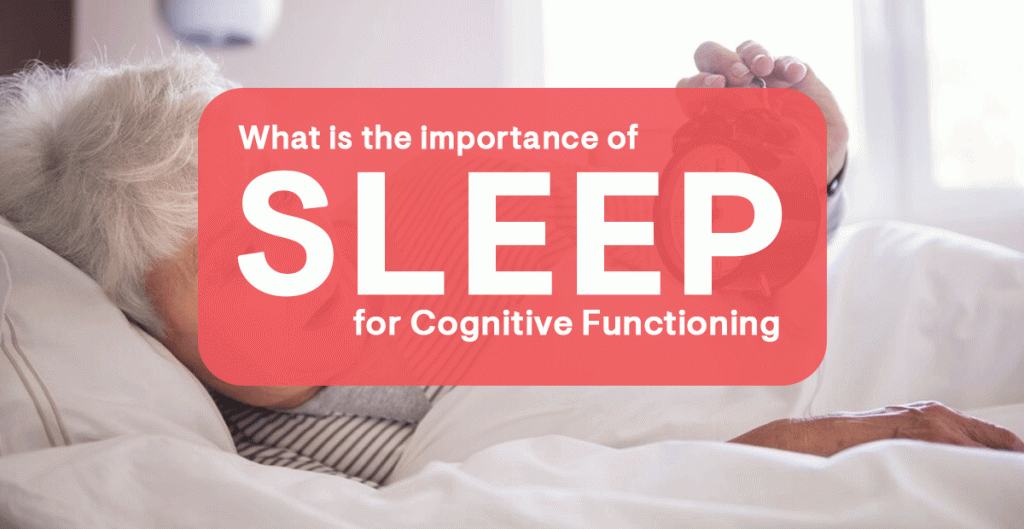
Did you know that 55 million people worldwide are living with dementia which is a condition that results in various diseases and injuries that affect the brain. (Source: World Health Organization) Dementia sometimes occurs due to sleep related problems and dysfunctions of your cognitive health and this is where the importance for sleep in cognitive functions comes in. Cognitive functioning is usually a term which refers to an ability in which you can process your thoughts, knowledge and information. It also includes memory which is the ability of yours to learn new information, speech, understanding of written and spoken language, decision-making, planning and problem solving.
With cognitive functions you can go through a lot of complex situations, can easily make decisions and plan for your future and without it your ability to work, learn, communicate and connect with others would be zero. And, if we talk about sleep then you should know that sleep is an important piece of puzzle when it comes to your overall health. Sleep regulates your mood and reduces stress and anxiety levels in your body. Lack of sleep would result in problems like obesity, heart disease, diabetes and many types of cancers. That’s why through this blog we want to share why sleep is so important for our cognitive function. But first let’s understand the relation between Cognitive functions and sleep.
Sleep has a lot of impact on your cognitive functions and during the different stages of sleep especially at the time of deep REM (Rapid Eye Movement) stage, your brain actively works to process the information gathered throughout the day and form neural connections. If you sleep less than you might face cognitive impairments such as difficulty in learning, problem-solving and decision-making. All of this can also affect our emotional and social intelligence which will make it difficult for you to interpret the emotions and reactions of others. Sleep deprivation can also lead to decreased concentration, impaired judgment and longer reaction times.
Cognitive function that is known to be affected by your sleep is memory consolidation. During your sleep your brain consolidates and strengthens the neural connections that form your memories. This process is important if you want to learn or want to recall a memory. Sleep will help you retain information and recall it when you need it and contributes to improved productivity and performance. Sleeping less will also lead to attention lapses, reduced concentration and difficulty focusing on the environment.
What distinguishes Soma from other muscle relaxants?
Here we have talked about two ways through which you can improve your sleep for better cognitive functions.
Good sleep hygiene is the habits and practices that are related to sleeping well on a regular basis and your cognitive functions like memory, attention and the ability to learn and reasons are influenced by the quality and quantity of your sleep. Sleep also gives your brain an ability to consolidate memories and process information from your whole day. It also makes your brain rest and recover so that you are prepared for your tasks the next day. Sleeping less can lead you to cognitive impairments which includes difficulty in concentrating, reduced problem-solving skills and memory issues.
Sleeping nicely enhances your cognitive functions and you can have a good sleep by maintaining a consistent sleep schedule by going to bed and waking up at the same time every day, even on your weekends. It is also important to create a sleep-friendly environment which is dark, quiet and free from any sort of electronic devices. To improve your sleep we recommend you to also limit your daytime naps to 30 minutes.
With a healthy diet you not only improve your cognitive functions but also increase your quality of sleep which is important for your cognitive health. Some of the foods contain nutrients that will enhance your sleep quality and duration and will promote better cognitive performance. For example, some foods are rich in tryptophan, an amino acid that your body converts into serotonin and then into melatonin to help regulate your sleep. This also includes dairy products, nuts, seeds, bananas, honey and eggs. With that eating complex carbohydrates like rice and bread makes tryptophan enter your brain and promotes sleep.
If we talk about eating minerals like magnesium and calcium that are found in leafy greens, nuts, seeds and dairy products also induce your sleep. Magnesium is known for decreasing cortisol, a ‘stress hormone’ in your body which can keep you up at night and calcium helps the brain use tryptophan to build melatonin. That’s why it is important to consume a balanced diet to improve sleep quality which would eventually enhance your cognitive functions.
Conclusion
Now, you must have understood how important sleep is for better cognitive functions. If you want to improve sleep for cognitive functions all you have to do is maintain a sleep schedule, avoid caffeine and daytime naps and also work on your diet and consume food that is rich in minerals like magnesium and calcium.
Also Read : Gabapentin and alcohol: is it dangerous?